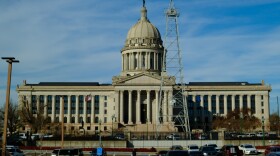Oklahoma State Auditor and Inspector Cyndi Byrd says state agencies mismanaged or questionably spent almost $100 million in pandemic relief funds during the 2023 fiscal year. The most in a single year so far, by a long shot.
Over the course of the state's fiscal year 2020, the questionably spent federal funds totaled around $34.1 million. In FY 2021, the amount decreased to $29.2 million. Then up again in 2022, to $30.1 million.
In FY 2023, the federal money that has reportedly gone missing or been otherwise misspent by state agency and nonprofit officials on something other than its federally directed use has nearly tripled compared to the previous years, according to state auditor and inspector Cyndi Byrd.
"While we've seen a substantial increase in questioned costs ever since COVID, $93.4 million is an unprecedented number," Byrd said during a Wednesday press conference at the State Capitol.
From 2020 to 2023, she said, Oklahoma state agency and nonprofit officials have mismanaged about $186 million of pandemic relief money. It was meant to bolster public services like rental and utility assistance for families, or quality childcare in areas with high need in the state.
Instead, some state agency officials are accused of using federal dollars to fund home remodeling projects and, in one case, to pay off a Cadillac.
The federal government can request the return of any mismanaged or questionably spent money, a prospect that could mean Oklahoma taxpayers shelling out millions of dollars needed by the state to pay federal authorities back.
In April, the U.S Department of Treasury requested a refund of $1.6 million Byrd found questionable back in 2021. That number could go up by tens of millions in the coming years, as the department clears a backlog of questioned dollars from across the country.
"The feds are several years behind in reviewing audits, which is why they've only just begun to request repayment for question costs from four years ago," Byrd said. "One thing is clear: for now, questioned costs are continuing to accumulate year after year after year."
Two state agencies are responsible for the bulk of FY23's questioned money
The Oklahoma Office of Management and Enterprise Services (OMES) and the Oklahoma Department of Human Services (OKDHS) are jointly responsible for $85.4 million of the total questioned pandemic relief dollars for State Fiscal Year 2023.
That's about $21.8 million at the management and enterprise office and $63.6 million at the human services department. The rest, about $8 million, involves other state agencies with much smaller amounts each, Byrd said.
In large part, Byrd said, a common issue leading to questioned dollars was a lack of experience and training in managing such large sums of money, combined with the fast-paced and confusing crisis of the COVID-19 pandemic.
"We've had multiple internal control deficiencies reported over many years," Byrd said. "So this was not a new surprise to any of the entities that they needed to work on their internal controls."
That's why she's been pushing state agency officials to undergo training available at her office, she said, though that doesn't seem to be making any difference.
"We are concerned about the trajectory," Byrd said. " As we've released these findings. We've tried to help agencies understand what is required in an audit. I can only hope that next year will be better."
Most of the questioned costs were a result of state agencies approving unallowed expenses related to contracting for emergency rental assistance or child care access — the timing of expense reports and payouts being off, and expenses being reported without documentation or unallowable costs, for example.
But Byrd said some of the most egregious questionable uses of funds under the supervision of state department of human services officials were not as alarming to federal authorities as they were to her office.
The federal government provided a lot of leeway to the states in terms of how they deployed the money, she said, and OKDHS did so with little guidance for day care operators on how to spend it, and without monitoring them. So, "'bad actors were able to game the system at taxpayers' expense," she said.
"One recipient who operated a daycare out of their private home used the money to install granite countertops in their kitchen," Byrd said. "In fact, there were several instances of home daycares taking child care development funds and using them for lavish bath or kitchen remodels, some costing between 30 and $40,000. Another recipient spent $20,000 to pay off a Cadillac."
She said the federal government dismissed her office's concerns about such purchases.
"They said that almost any purchases, even those that appear unnecessary or wasteful, would be permitted as long as they could be construed as having a remote connection to child care," Byrd said. "A Cadillac, they said, could be used for transportation.
"So per the federal government's advice, we did not question granite countertops or Cadillacs."
Byrd said that ultimately, her role is to investigate spending and hold stewards of taxpayer dollars accountable.
"Every dollar that's spent is a tax dollar, and it is spent to deliver services to the people," and I've just presented two agencies where the tax dollars that they spent did not deliver services, and some people did without."
And that could mean Oklahomans paying back millions of dollars to federal authorities they never saw benefit from






